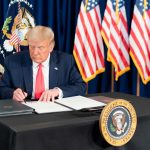Senator Roger Marshall of Kansas is stepping up to the plate yet again, this time launching an investigation into the tech giant Google. The senator’s inquiry comes on the heels of reports suggesting that Google intentionally suppressed search results related to an assassination attempt on former President Donald Trump. This odor of censorship is making the rounds, raising eyebrows among conservatives who see it as yet another assault on free speech and conservative discourse.
The allegations arose after it was noticed that Google’s search autocomplete feature conspicuously omitted the incident involving Trump’s assassination attempt. Critics have leaped to the conclusion that this wasn’t just a random glitch but rather a systematic effort to downplay an explosive story. Google has flippantly dismissed these claims, insisting that they did not aim to conceal any information. However, Marshall’s skepticism about the search engine’s explanations reflects a broader concern that the platform is carefully curating what information gets out to the public.
🚨BREAKING: I am launching a full investigation into @Google’s censorship & bias that is constricting the free flow of information. Google, the largest Search Engine Operator in the world, has become a propaganda wing of the Left. No more hiding behind your algorithm- your time… pic.twitter.com/l40L4TVQS4
— Dr. Roger Marshall (@RogerMarshallMD) July 31, 2024
In a letter addressed to Google CEO Sundar Pichai, Marshall voiced his outrage, branding the apparent omission as blatant discrimination against Trump and his supporters. He emphasized that such actions not only undermine the intent of Section 230—rules designed to provide a legal shield for online platforms—but also highlight Google’s troubling tendency to favor leftist ideologies. Marshall has made it abundantly clear that he views the company as an enabler of the left, asserting that Google has transformed into a “propaganda wing” for the Biden administration.
Marshall didn’t hold back when he articulated that Google ought to lose its protections under Section 230 if it decides to act like a biased media outlet rather than a neutral platform. He provocatively charged that if Google wants to emulate MSNBC’s editorial stance, they should face the same scrutiny and accountability, especially when they are engaging in censorship practices. In his view, Google should be a venue for open discourse, not a gatekeeper determining which narratives can thrive.
The senator’s take also raised the alarm over what he sees as an example of “election interference.” By managing how information about Donald Trump is presented—especially in light of recent political events—Google may be influencing public perception in a way that distorts democracy. In a landscape where technology firms wield immense influence over public discourse, conservative leaders like Marshall are pushing back against what they perceive as a complicit role those firms play in manipulating the political narrative.
As this controversy unfolds, it’s important to keep an eye on Google’s operations, especially given its documented history of liberal bias. Conservatives are rightly concerned that such suppression tactics can have far-reaching implications, shaping not just conversations but also the political landscape itself. If the investigation confirms these allegations, it could mark a significant turning point in the ongoing battle over free speech and the power of big tech in American politics.




